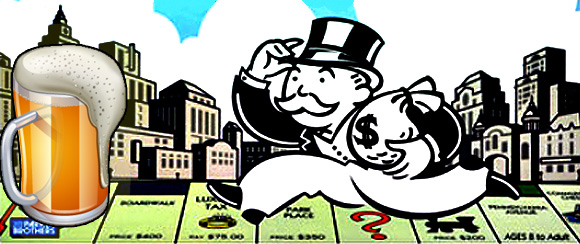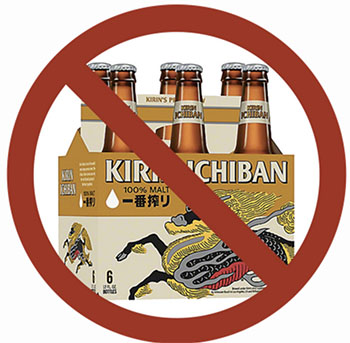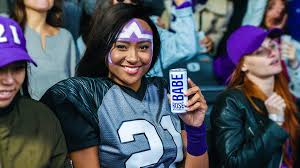In the Doghouse
ABI's Monopoly Moves Must Be Stopped
 Watchdog Bruce Lee Livingston Calls for CA AG Investigation of Anheuser-Busch InBev Anti-Competitive Takeover of LA Beer Distributor
Watchdog Bruce Lee Livingston Calls for CA AG Investigation of Anheuser-Busch InBev Anti-Competitive Takeover of LA Beer Distributor
Alcohol Justice Executive Director/CEO Livingston today requested a full-scale investigation by Attorney General Xavier Becerra of the attempted takeover of Ace Beverage LLC in Los Angeles. There is a federal court order enjoining Anheuser-Busch InBev (ABI) to not take over more than 10% of the wholesale beer distribution in the US. However, if this gobbling up of a Los Angeles wholesaler takes place, ABI will control 40% or more of the beer distribution market in California. Mom-and-pop retailers could see price wars, craft brews could be forced off the beer trucks, and illegal promotions and swag could be pushed on beer outlets and bars. Outgoing ABI CEO Carlos Brito could be furthering monopolistic practices in seeking global dominance, at the risk of LA small businesses and vulnerable wholesalers. The antitrust California Cartwright Act and case law need to be invoked to start a full-scale California look-see into Big Alcohol's pursuit of monopoly practices.
READ MORE about Alcohol Justice's call to stop the ABI takeover
READ MORE - full text of the Alcohol Justice complaint letter
Blood Weighs Heavy on Light Beer
 For each sip of Kirin Ichiban’s beer that trickles down consumers’ throats, more money trickles into the pockets of Myanmar’s genocidal military, according to Amnesty International. In a series of reports over the past two years, the organization has flagged a partnership between the Japanese megabrewer Kirin and Myanmar Economic Holdings Ltd. (MEHL), a business conglomerate directly owned by Myanmar armed forces. In response, the International Campaign for the Rohingya is urging a boycott of the Japanese-based megabrewer as part of a continued effort to halt human rights abuses along the Myanmar-Bangladesh border.
For each sip of Kirin Ichiban’s beer that trickles down consumers’ throats, more money trickles into the pockets of Myanmar’s genocidal military, according to Amnesty International. In a series of reports over the past two years, the organization has flagged a partnership between the Japanese megabrewer Kirin and Myanmar Economic Holdings Ltd. (MEHL), a business conglomerate directly owned by Myanmar armed forces. In response, the International Campaign for the Rohingya is urging a boycott of the Japanese-based megabrewer as part of a continued effort to halt human rights abuses along the Myanmar-Bangladesh border.
In 2017, Myanmar armed forces, in response to militant attacks on police outposts, began systematically destroying the villages of the primarily Muslim Rohingya ethnic minority. To date, at least 280 villages have been destroyed, and 6,700 people killed by violence, as well as over half the total population forced to flee to refugee camps in neighboring Bangladesh. The remaining half million Rohingya in Myanmar remain at serious risk, according to the UN.
In the case of Kirin, this is not merely a case of money invested in the developing world being appropriated by bad actors. According to the Guardian, unlike companies in the United States (and most of the rest of the world), MEHL holdings are split into ownership by individual military battalions. Amnesty International has been able to track MEHL shareholder dividends down to specific units complicit in war crimes against the Rohingya.
Kirin has expressed concern and promised to start investigating, but to date there is no documented effort to decouple its brewing business from the military. Until it does, Alcohol Justice stands with Rohingya International in urging a boycott of Kirin products.
Products produced by Kirin include:
- Kirin Ichiban (USA)
- Four Roses (bourbon, USA)
- San Miguel (Philippines)
- Brooklyn Brewery (USA)
- New Belgium Brewery (Fat Tire, USA)
- Fourpure Brewing (UK)
- Magic Rock (UK)
- Tooheys (Australia)
- Speight’s (Australia)
- Panhead (New Zealand)
- Emerson’s (New Zealand)
READ MORE about the Kirin boycott
READ MORE about how Big Alcohol profits off misery in the developing world
Babe Wine: Condescending, Concentrated, and #COVIDwashed
 There are several marketing strategies that are guaranteed to get a product in the AJ doghouse. Does it used gendered branding to target women? Does it piggyback on a sports sponsorship, thus reaching tens of millions of underage viewers? Is it formulated and packaged in a way to all but guarantee dangerous consumption patterns?
There are several marketing strategies that are guaranteed to get a product in the AJ doghouse. Does it used gendered branding to target women? Does it piggyback on a sports sponsorship, thus reaching tens of millions of underage viewers? Is it formulated and packaged in a way to all but guarantee dangerous consumption patterns?
Annheuser-Busch InBev’s newly acquired Babe Wine does all three, and shamelessly adds another: urging consumers to drink to ease the anxiety that accompanies the global COVID-19 outbreak. This is a remarkable quadfecta of contempt for consumers.
Babe was initially brought to market by a group headed up by Josh Ostrovsky, an internet influencer known also as The Fat Jew. Ostrovsky, already notorious for stealing other online comedians’ work and passing it off as his own, joined with two business partners to launch a brand targeted squarely at young women. Co-founder David Oliver Cohen told Fortune magazine, “One thing that stood out to us was there was nothing in the wine and spirits space for women and younger drinkers to drink at sporting events and concert venues.”
Yet this targeting is of particular concern. Women currently make for a ripe target for the alcohol industry in the United States, having drank less frequently and at less volume than men in the past. This gap has closed quickly, however, and the surge of consumption among women has created an identical surge in diagnoses of alcohol use disorder (AUD). This is compounded by the fact that women who drink face risks that men do not, particularly a dramatically increased risk of breast cancer.
Needless to say, this risk has also meant a windfall for Big Alcohol.
AB InBev has been quick to enjoy this windfall, buying Babe out (but continuing its association with Ostrovsky) and making it the official wine of the NFL. Because alcohol marketing through sporting events—and AB InBev’s ownership of NFL marketing in particular—reaches tens of millions of youth nationally, Babe is positioning itself to be attractive to underage girls. Since exposure to alcohol marketing predicts younger drinking, and since the earlier someone starts drinking the more likely they are to develop unhealthy drinking patterns, Babe and the NFL become a perfect vortex to bring additional alcohol harm to young women.
This is worsened by the fact that Babe is stronger than beer, and dramatically so. A can of Budweiser is around 4% alcohol by volume. A can of Babe, on the other hand, is three times as strong. A single can would bring a drinker to threshold of binge drinking for women; two cans would go well beyond binge level for woman or men.
Yet this is made worse yet by Babe’s newest ad campaign. In an email headlined “WE JUST WANT YOU TO BE HAPPY,” the brand proudly boasts “We are the official wine of daydrinking and falling asleep by 10pm so you don’t wake up feeling like a complete garbage.” [sic] This email, which comes with a discount code for ordering in bulk, was sent in late April. In short, it takes advantage of laxened restrictions around delivery to promote all-day drinking during COVID-related shelter-in-place orders. This is not just tacky and tone deaf, it is another example of Big Alcohol deliberately undermining public health.
There are multiple issues surrounding the world’s treatment of alcohol during this crisis. Among them is a reckless promotion of alcohol purchasing as an economic driver, even though alcohol a) lowers inhibitions thus encouraging reckless behavior; b) is associated with domestic violence and other interpersonal trauma; and c) suppresses the immune system. The WHO strongly recommends limiting, not promoting, alcohol access during lockdowns. Yet instead, many common-sense alcohol regulations have been lifted throughout the United States.
In the case of a product like Babe, even the commonly used excuse—that loosened alcohol sale regulations provide economic protections for the service industry—are rendered meaningless. Annheuser-Busch InBev is a multinational alcohol megacorporation; there is no benefit to communities in allowing it to drop cases of a high-potency wine targeted at (very) young women on peoples’ doorsteps. This is #COVIDwashing pure and simple: capitalizing on the fear, misery, and confusion in a time of illness to make money from a product that kills as relentlessly as any virus.
READ MORE about reckless alcohol deregulation in response to COVID-19.
READ MORE about pinkwashing—the industry practice of targeting women using breast cancer awareness to sell a cancer-causing product.
WATCH Fake Randy Diaz tell us to get AB InBev out of the NFL.
More Articles ...
Help us hold Big Alcohol accountable for the harm its products cause.
| GET ACTION ALERTS AND eNEWS |
STAY CONNECTED    |
CONTACT US 24 Belvedere St. San Rafael, CA 94901 415-456-5692 |
SUPPORT US Terms of Service & Privacy Policy |


